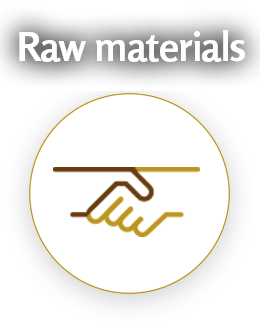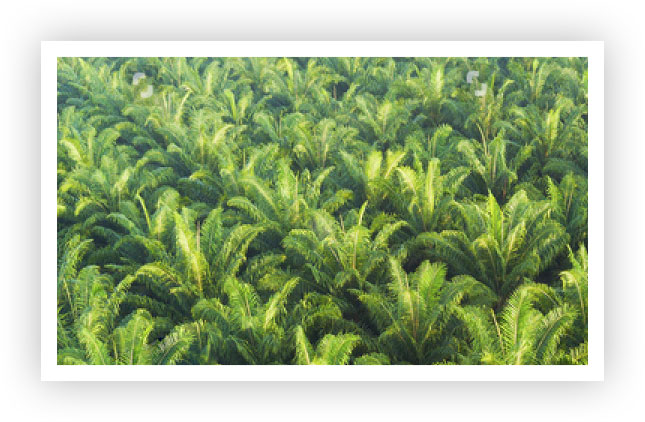Ingredients from sustainable cultivation
For us, sustainability in raw materials like cocoa and palm oil means that the families in the countries of origin can make a good living from cultivation with time trading also being compatible with nature. We use established certifications, the solution-oriented cocoa sustainability program cocoa commitment, and we are involved in sustainability institutions.
This is why sustainable raw materials are so important
If we want to continue using high-quality raw materials tomorrow, we must ensure greater sustainability today. Two dimensions matter here. The first dimension is sustainability in terms of nature conservation because cocoa, for example, will ultimately thrive only in intact ecosystems. The second dimension is social responsibility because only a good income and good working conditions allow people on farms to make a good living from agriculture and operate sustainably.


The raw material cocoa
The raw material cocoa
Much of the cocoa is grown by small farmers in West Africa. Many of them cannot make a good living from cocoa cultivation because they have little access to modern agricultural knowledge. What is more, local cocoa buyers do not always pay reasonable prices. To still be able to make a living, they often resort to clearing rainforest for new cultivation areas and cultivate existing areas too intensively. Commitment to sustainability is thus of particular importance.
Our commitment to sustainable cocoa sourcing
Ludwig Schokolade is involved in making cocoa more sustainable in many ways:
- We are a partner of the cocoa commitment sustainability program.
- We work as a certified partner with Rainforest Alliance and Fairtrade.
- We are a founding member of the Forum Nachhaltiger Kakao e. V. (Sustainable Cocoa Forum).
- We are a member of the Association of the German Confectionery Industry (BDSI) and support the Foundation of the German Cocoa and Chocolate Industry.


2. Certifications
2. Certifications
In the international food industry, globally recognized certifications are the basis for trust in cooperation. This also applies to sustainability. Two programs are particularly highly regarded and widely used: Rainforest Alliance and Fairtrade. Some of our products are certified by these partners, and we work with these sustainability seals.
Rainforest Alliance stands for a better future for people and nature. On certified farms, human rights must be respected. Farmers receive training which addresses issues like child labor and promotes gender equality and non-discrimination. The Rainforest Alliance also works to achieve better livelihoods for farmers and workers, for example, by encouraging farmers to use good agricultural practices that help improve crop yields and reduce costs. Farmers must protect natural resources and the environment by using land, water, and energy carefully. Farmers on certified farms use fewer artificial fertilizers and pesticides, preventing pollution and managing waste. They learn how to preserve forested and protected areas, which in turn helps support biodiversity. To learn more about the Rainforest Alliance, visit www.rainforest-alliance.org.
The independently controlled Fairtrade seal stands for fair trade and strengthens small farmers and employees in the countries of origin. They receive a secure minimum price for their goods and a Fairtrade premium for community projects in areas like health protection, education, or improving product quality. Fairtrade is also committed to combating child labor and promoting greater gender equality as well as climate and environmental protection.
3. What the Sustainable Cocoa Forum does
3. What the Sustainable Cocoa Forum does
As a founding member of the Forum Nachhaltiger Kakao e. V. (Sustainable Cocoa Forum), we are committed to fighting abuse in the cocoa industry. The forum aims to improve the living conditions of cocoa farmers and their families, conserve natural resources and biodiversity in the countries of origin, and expand the cultivation and marketing of cocoa certified according to sustainability standards. One project of the multi-stakeholder initiative is PRO-PLANTEURS, which aims to professionalize a total of 30,000 cocoa family farmers and their cocoa farmer organizations in the Ivory Coast. The project also aims to provide especially women with ways to earn a better income and provide a better food base for their families to impact their living conditions positively. We support both the Forum and PRO-PLANTEURS with annual payments.


4. Commitment with other German institutions
4. Commitment with other German institutions
We are a long-standing member of the Association of the German Confectionery Industry (BDSI) and support the Foundation of the German Cocoa and Chocolate Industry through it. These two institutions actively work to make cocoa cultivation more sustainable. Their specific funding and research programs focus on West Africa. Measures include assistance for cocoa farmers in land use by providing them with the appropriate required documentation for their land use rights. This program is implemented in cooperation with the Deutsche Gesellschaft für Internationale Zusammenarbeit (German Society for International Cooperation – GIZ), a federal company active in international development cooperation.
The raw material palm oil
Palm oil from sustainable cultivation only
The raw material palm oil
Palm oil from sustainable cultivation only
We use only RSPO-certified palm oil from sustainable cultivation of the higher “segregated” level. RSPO stands for “Round Table on Sustainable Palm Oil.” It is the world’s most important program for promoting sustainable palm oil management. No valuable virgin forests are cleared for this palm oil. This preserves the unique habitat for plants and animals. Palm oil of the higher “segregated” certification level is strictly separated from non-certified palm oil so that no mixing occurs anywhere along the entire production and supply chain.










